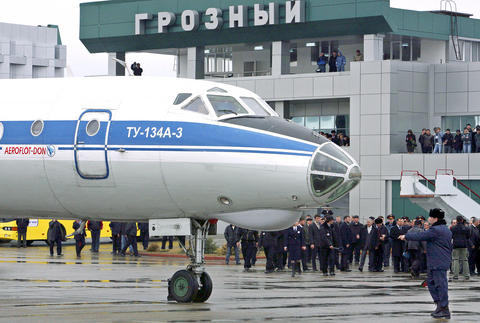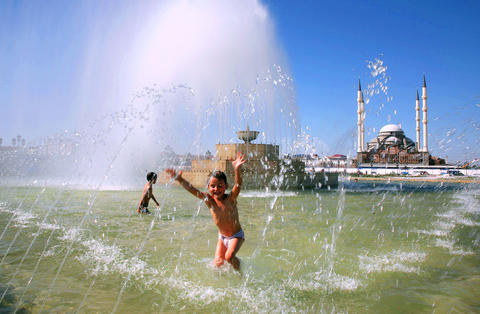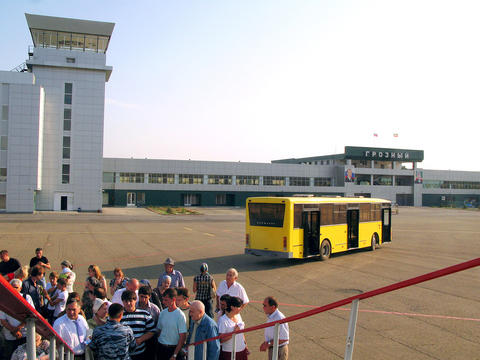The airliner descended toward what recently had been one of the most devastated cities on earth. The passengers gazed out the windows. Beneath them were intricate networks of bunkers and artillery trenches, traces of war cut deep into the soil.
These were the earthworks from which Russia's army fired barrages into the capital of Chechnya off and on for nearly a decade, reducing much of a city of roughly 400,000 people to rubble.
The trenches were empty. The plane descended gently, passing through airspace where not long ago almost no pilot would dare fly.

PHOTO : AP
The jet, an aging Tupolev 134, alighted on a rebuilt runway and taxied to a modern new terminal. So ended Flight 9633, the direct morning air service from Moscow to Grozny, a route that has begun to shift perceptions of Chechnya as a Russian republic still racked by war.
One Chechen passenger, a refugee who immigrated to Germany in 1999 and would give only his first name, Khalid, had spent the last minutes of the flight pressed near his window, snapping pictures with a digital camera, amazed to see peaceful scenes below.
"My relatives said the war is over, and I am coming home," he said. "They say Chechnya is quiet again."

PHOTOS: NY TIMES NEWS SERVICE
This single sentence - Chechnya is quiet again - is exactly the opinion of the Kremlin and its pro-Russian proxies in Chechnya, and exactly the sort of assessment of Russia's counterinsurgency efforts that few would have predicted.
Since this spring, Flight 9633 has been one of six daily flights ferrying passengers in and out of the republic, a service all but inconceivable even a year ago, when Grozny's airfield remained a broken airstrip beside ruins.
Violence continues in Chechnya, and there are skirmishes and occasional bombs in neighboring republics. But the fighting in the republic is limited and sporadic, and Grozny is in the midst of a building boom.

PHOTO : AP
With water and electricity restored in many neighborhoods, Grozny no longer matches its post-Soviet reputation as one of the world's most horrible cities. Airline service, Chechen officials say, is another example of a transformation.
Last year, when the Chechen president, Ramzan Kadyrov, pledged to resume civilian air service, he seemed to have chosen a task at which his government could only fail. At the time, Chechnya had no working civilian airfield. And Chechen separatist Web sites had made videos of aircraft being downed with heat-seeking, shoulder-fired missiles an Internet staple. Who would fly Air Grozny?
Bad omens abounded. In 2002, separatists shot down an Mi-26, Russia's largest military helicopter, killing more than 120 soldiers. In 2004, two female Chechen suicide bombers bribed their way through security checkpoints and exploded themselves on passenger planes after leaving Moscow.
The resulting crashes killed 89 people, cementing the public notion that Chechnya and civil aviation were incompatible terms.
But the insurgency has turned sharply in favor of pro-Kremlin Chechen forces since late 2004. Kadyrov, who was selected this year by President Vladimir Putin to become the republic's president, rushed through the airport's reconstruction and celebrated his political rise by welcoming the first flights on the repaired airstrip this spring.
To date, the remaining rebels have been unable to disrupt the air service, which Chechen officials say carries as many as 10,000 passengers a month, though that figure could not be independently verified.
On a recent flight, one passenger complained about the legroom. Others, who remember circuitous routes to the republic, on roads dotted with checkpoints, welcomed the new access to their homeland without complaint.
"This is convenient, " said Akhmed Shaukhalov, 27. "It should have been done a long time ago."
Kadyrov, his entourage and the indigenous paramilitary force that backs him, are confident enough in the demand for flights, and in the security conditions, that they say routes will be expanded soon.
"This is only the first step," said Sultan Satuyev, a former police official who is the airport's general director.

April 28 to May 4 During the Japanese colonial era, a city’s “first” high school typically served Japanese students, while Taiwanese attended the “second” high school. Only in Taichung was this reversed. That’s because when Taichung First High School opened its doors on May 1, 1915 to serve Taiwanese students who were previously barred from secondary education, it was the only high school in town. Former principal Hideo Azukisawa threatened to quit when the government in 1922 attempted to transfer the “first” designation to a new local high school for Japanese students, leading to this unusual situation. Prior to the Taichung First

The Ministry of Education last month proposed a nationwide ban on mobile devices in schools, aiming to curb concerns over student phone addiction. Under the revised regulation, which will take effect in August, teachers and schools will be required to collect mobile devices — including phones, laptops and wearables devices — for safekeeping during school hours, unless they are being used for educational purposes. For Chang Fong-ching (張鳳琴), the ban will have a positive impact. “It’s a good move,” says the professor in the department of

On April 17, Chinese Nationalist Party (KMT) Chairman Eric Chu (朱立倫) launched a bold campaign to revive and revitalize the KMT base by calling for an impromptu rally at the Taipei prosecutor’s offices to protest recent arrests of KMT recall campaigners over allegations of forgery and fraud involving signatures of dead voters. The protest had no time to apply for permits and was illegal, but that played into the sense of opposition grievance at alleged weaponization of the judiciary by the Democratic Progressive Party (DPP) to “annihilate” the opposition parties. Blamed for faltering recall campaigns and faced with a KMT chair

Article 2 of the Additional Articles of the Constitution of the Republic of China (中華民國憲法增修條文) stipulates that upon a vote of no confidence in the premier, the president can dissolve the legislature within 10 days. If the legislature is dissolved, a new legislative election must be held within 60 days, and the legislators’ terms will then be reckoned from that election. Two weeks ago Taipei Mayor Chiang Wan-an (蔣萬安) of the Chinese Nationalist Party (KMT) proposed that the legislature hold a vote of no confidence in the premier and dare the president to dissolve the legislature. The legislature is currently controlled